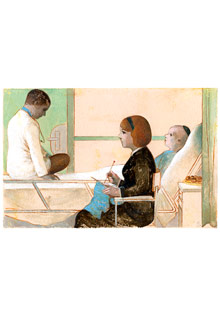
Illustration: Gerard Dubois
As a physician, Kent Sepkowitz is a rational man of science. But a question posed by a patient's mother revealed that science isn't everything.
I recently helped care for a child with leukemia. He was a sweet, thin-boned kid, hairless and pale from chemotherapy, with dark Lillian Gish eyelids. He and his family were Orthodox Jews and he wore a yarmulke, holding his neck perfectly still so the cap wouldn't slide off his bald head.The boy's parents and various siblings were usually in the room with him. Electric candles sat near the refrigerator; here and there were cookies and rolls wrapped in plastic. The family spoke carefully and was clearly familiar with his health issues, particularly the mother. She noticed everything, wrote nothing down, and weighed new information with surprising detachment.
The child never had a good day. Fevers and cough, and scan after scan, week after week. The family, though, remained patient and polite, every day offering me a nibble of food, maybe a little something for later too.
One afternoon, I lingered a bit longer than usual. The little boy was playing a video game with intense focus—a testament to the ability of a video game to distract.
The mother was the only other person in the room. She was busy knitting. "So no good news for me today?" she asked.
"I guess not."
"Nothing at all?"
"Don't ask," I replied, smiling. During the hospitalization, "don't ask" had become my shorthand to indicate the latest information was nothing but a tangle of confusing test results that revealed nothing useful—a fairly common state of affairs.
She noticed I was watching her son. "He's something, yes?"
"Of course."
After a long pause she resumed. "You wonder how I can stand this." The sun through the window made her skin appear whiter, almost spectral. "What sort of God would do this to my baby?"
"Actually," I said cautiously, "I do wonder." Indeed, I have spent a considerable amount of time trying to reconcile the irreconcilable fact of children with cancer. For years my office was several floors above the pediatric clinic in the cancer hospital where I work. Every morning the kids would enter the elevator with me—bald ones wearing New York Mets caps, babies with intravenous catheter bags hooked onto their strollers, teenagers on crutches. The woman's boy was merely the latest addition to my dark confusion about kids and cancer.
She shrugged. "Who knows?" she said. "Not me." She returned to her knitting. "We don't know what God intends."
I said nothing.
She stared up at me, perhaps a bit steamed, and said, "You wanted a fancier answer? A big revelation?"
"No," I said. "I just...you know."
The boy was still locked in his game, calmly ignoring whatever the adults were discussing. His mother scanned me up and down. "You aren't observant?" she said.
"Not really."
I am used to harsh dismissals from those more religious than me, but she had something else in mind. "So you say." She continued to knit amid a dramatic pause. Her hands moved swiftly, expertly. "Let me ask you then, Doctor. Why do you come see him the same time every day?"
"I do?" I said, surprised.
"Doctor, please. Don't disappoint me." The knitting needles clacked, the video game bleated.
"Well, the lab results come out late. I don't know. Never thought about it."
"Every day, Doctor. The same time."
"Maybe. I guess so."
She continued to knit, not looking up. "You know. You went to medical school. Please, don't disappoint me."
I waited. "Really? Tell me."
She sighed heavily, for the first time betraying the burden of caring for a dangerously ill child. "Why?" she said. "Because what would happen, Doctor"—she now glanced at me—"what would happen if you didn't?"
I shook my head. "I would be late?"
Another sigh. "No. You couldn't. You couldn't come at another time." She finally looked at me. "See, Doctor," she said, her face glowing, "you, too, are observant. It is your way."
I stayed a long time in the room, but she said nothing else. She continued to knit, the Orthodox Madame Defarge. The boy shook the controls of the video game and grumbled. I wandered out.
For the next few weeks, the mother gave me a radiant smile whenever I arrived at the room, but we never resumed our discussion. I made a point, however, of changing the time I went to the pediatrics floor—I would show her a thing or two. I visited first thing in the morning or else at the end of the day.
To my surprise, though, I found it very uncomfortable to visit at the new times. My routine had deeper and more mysterious roots than I had realized. And eventually I could fight it no longer—I once again began to visit the floor in the late afternoon.
After several weeks, the boy was discharged. He and his family returned home for a few months so that he could rest up for a bone marrow transplant. I never saw him again.
I could discover his fate with a few simple computer keystrokes. But here, too, superstition or habit or faith or whatever one calls it trumps rational thinking. I worry that by looking him up, I might jinx him. You see, we doctors never really know why one patient gets better while another dies. So like primitive animals, we often go about our business along the same well-worn rut. We are scientists, sure—but when the chips are down, we're never too far from rubbing a rabbit's foot.




